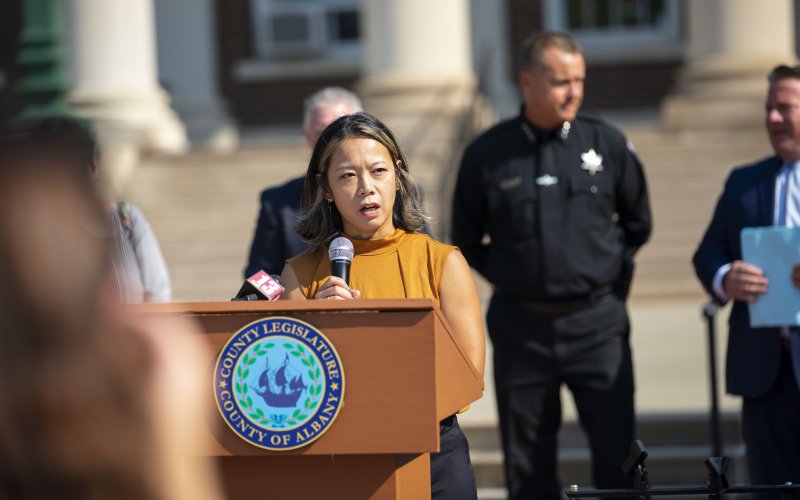SPH, SSW Study Examines Alternative to Police Responses in Albany County

ALBANY, N.Y. (Sept. 13, 2022) — A joint study by faculty and graduate students in UAlbany’s schools of Social Welfare and Public Health is helping Albany County officials evaluate the success of a new program designed to reduce law enforcement involvement in nonviolent emergency calls – and inform the program’s expansion.
Known as ACCORD— short for Albany County Crisis Officials Responding and Diverting — the pilot launched in June 2021 in the Albany County Hilltowns to reduce unnecessary interactions between law enforcement and people with mental or behavioral health issues and the avoidable arrests and other adverse outcomes that often result.
The program relies on a collaboration between the Albany County Sheriff’s Office, its emergency medical services and the Albany County Department of Mental Health, which has overseen the county’s Mobile Crisis Teams for many years. Under the pilot protocol, sheriff’s office dispatchers triage emergency calls and divert them to an ACCORD team of medical and behavioral health professionals.
The evaluation led by Professor Carmen Morano of SSW and Associate Professor Tomoko Udo of SPH found that ACCORD is filling an important service gap by connecting people to services that they had not previously used. The evaluation, which comes as county officials have begun discussions to expand the program beyond the rural Hilltowns to more populous areas, also found that as the program grows it may need to increase and standardize staff training and improve public awareness.
During the year-long pilot, 240 calls were diverted to the ACCORD team. Those calls involved 548 separate encounters, or interactions, with 210 unique individuals, the vast majority of whom had never used services provided by the Department of Mental Health before.
“We found that the ACCORD team was able to effectively resolve many low-priority medical and mental health emergency cases on the scene and to link patients and their family members to appropriate care and services when needed,” said Udo, who teaches in SPH’s Department of Health Policy, Management, and Behavior. “Stationing the team in Clarksville also helped the ACCORD program fill important service gaps, particularly in a community that traditionally lacks access to behavioral health and medical services.”
Morano, who directs SSW’s doctoral program, noted that ACCORD can only be as effective as the community-based resources available to the clients it serves.
“Our evaluation highlights the importance of community-based programs and services, especially in mental health inpatient acute care settings,” Morano said. “The availability and accessibility of long-term treatment is also an ongoing challenge, and it will be critical to fill these gaps to ensure the best outcomes.”
Morano and Udo oversaw a team of graduate students — Preston Roberts, Shannon Mullin and Denard Cummings from SPH, and Jordan Dyett from SSW — who conducted the data collection and analysis.
Albany County officials held a press conference on the Downtown Campus Sept. 9 to summarize the evaluation’s findings and discuss the next steps for ACCORD. Those in attendance included Albany County Legislature Chair Andrew Joyce, County Executive Daniel P. McCoy, Sheriff Craig Apple, Albany County Mental Health Commissioner Stephen Giordano and Assemblymember John T. McDonald III.
A copy of the county’s announcement and the full evaluation is available on Albany County's website.




